British company Oxitec is working on genetically modified insects that are designed to kill off pests that feed on crops such as cabbages, broccoli, tomatoes and fruit
Has begun talks with Defra to trial GM moths in British fields
Firm claims the technology is a green alternative to the use of chemical sprays, which have their own dangers for human health and the countryside
Daily Mail
By Sean Poulter

Millions of GM insects developed by British scientists could be released into food crop fields without proper safety checks, it is claimed.
The British company Oxitec is working on genetically modified insects that are designed to kill off pests that feed on crops such as cabbages, broccoli, tomatoes and fruit.
The firm insists the technology is a green alternative to the use of chemical sprays, which have their own dangers for human health and the countryside.
It accused critics of scaremongering and said there is zero chance of its insects being used on farms without thorough checks on all aspects of their safety.
However, a new report from GM critics and public interest groups argues food watchdogs in Britain, Europe and beyond are failing to put in place a thorough testing and safety regime.
They warn, for example, that the larvae of these GM insects could get in to human food on vegetables and fruit without any checks on the risk to health.
Oxitec has already developed a number of GM insects, including moths and mosquitoes.
Its technology involves inserting a lethal gene into male insects which are then released in large numbers to mate with their wild female counterparts.
This gene is passed on to any resulting offspring, such as caterpillars, which die quickly before attacking vegetable crops, so boosting farm yields and profits.
The firm has had talks with the food and farming department DEFRA and Britain’s Health and Safety Executive(HSE) about trials with GM diamondback moths, which are designed to kill off pests that feed on cabbages.
The company has already run trials in the Cayman Islands, Brazil and Malaysia where millions of its GM mosquitoes have been released in an effort to reduce the wild population which is responsible for spreading Dengue fever to humans.
The coalition of public interest groups challenging the effectiveness of the safety regime includes GeneWatch UK, TestBiotech, SwissAid, Berne Declaration, and Corporate Europe Observatory.
The group complained: ‘Plans to commercialise GM insects would result in many millions of GM insects being released in fields of crops, including olives, tomatoes, citrus fruits, cabbages and cotton.
‘In future, any insect species might be genetically modified.’
They claim that Oxitec has lobbied to ensure that experts who support the use of GM insects have been appointed to
key committees set up by the European Food Safety Authority(EFSA).
These committees are responsible for designing the policing regime for the controversial technology.
As a result, they fear that the system will not be sufficiently rigorous to protect public health and the environment.
Dr Helen Wallace, the director of GeneWatch UK said: ‘The public will be shocked to learn that GM insects can be released into the environment without any proper oversight.
‘Conflicts-of-interest should be removed from all decision-making processes to ensure the public have a proper say about these plans.’
Christoph Then(correct), Executive Director, Testbiotech, said: ‘Risk assessment of genetically engineered animals touches many areas where there is lack of knowledge.
‘We are concerned that EFSA will apply a biased and selective protocol to safety without really sorting out potential hazards.’
Tina Goethe, SwissAid, said: ‘The development of GM-insects for agriculture implies unforeseeable risks for human health and environment. In order to meet the challenges of small scale agriculture in poor countries, we do not need expensive and high risk technologies, but agro-ecological solutions.’
Oxitec chief executive, Hadyn Parry, accused the groups of scaremongering.
‘To assert that a small company of our size can bias and subvert regulatory processes around the world in some kind of Machiavellian way is pure conspiracy theory nonsense,’ he said.
‘We are a company with a high scientific reputation and we hope people will see what we are doing in terms of the protection of human health.
There are also huge environmental benefits in terms of the reduction of pesticide use.’
He said Oxitec’s safety testing is very similar to the controlled clinical trials used to test and approve new medicines.
‘It is complete nonsense to suggest that GM insects could be released without a proper safety assessment,’ he said.
‘Decisions on whether, when and how to introduce new technological advances – of whatever type – should go through the proper channels and regulatory systems. Each product should be judged on its merits and the benefits and risks assessed.’
DEFRA insists it has made no decisions on whether to allow GM insect field trials and that it will be guided by experts who sit on ACRE, the Advisory Committee on Releases to the Environment.
However, the department has a record of supporting biotechnology and is lobbying in the EU for a speeding up of the approval system for GM crops.
HOW IT WORKS
Oxitec has already developed a number of GM insects, including moths and mosquitoes.
Its technology involves inserting a lethal gene into male insects which are then released in large numbers to mate with their wild female counterparts.
This gene is passed on to any resulting offspring, such as caterpillars, which die quickly before attacking vegetable crops, so boosting farm yields and profits

